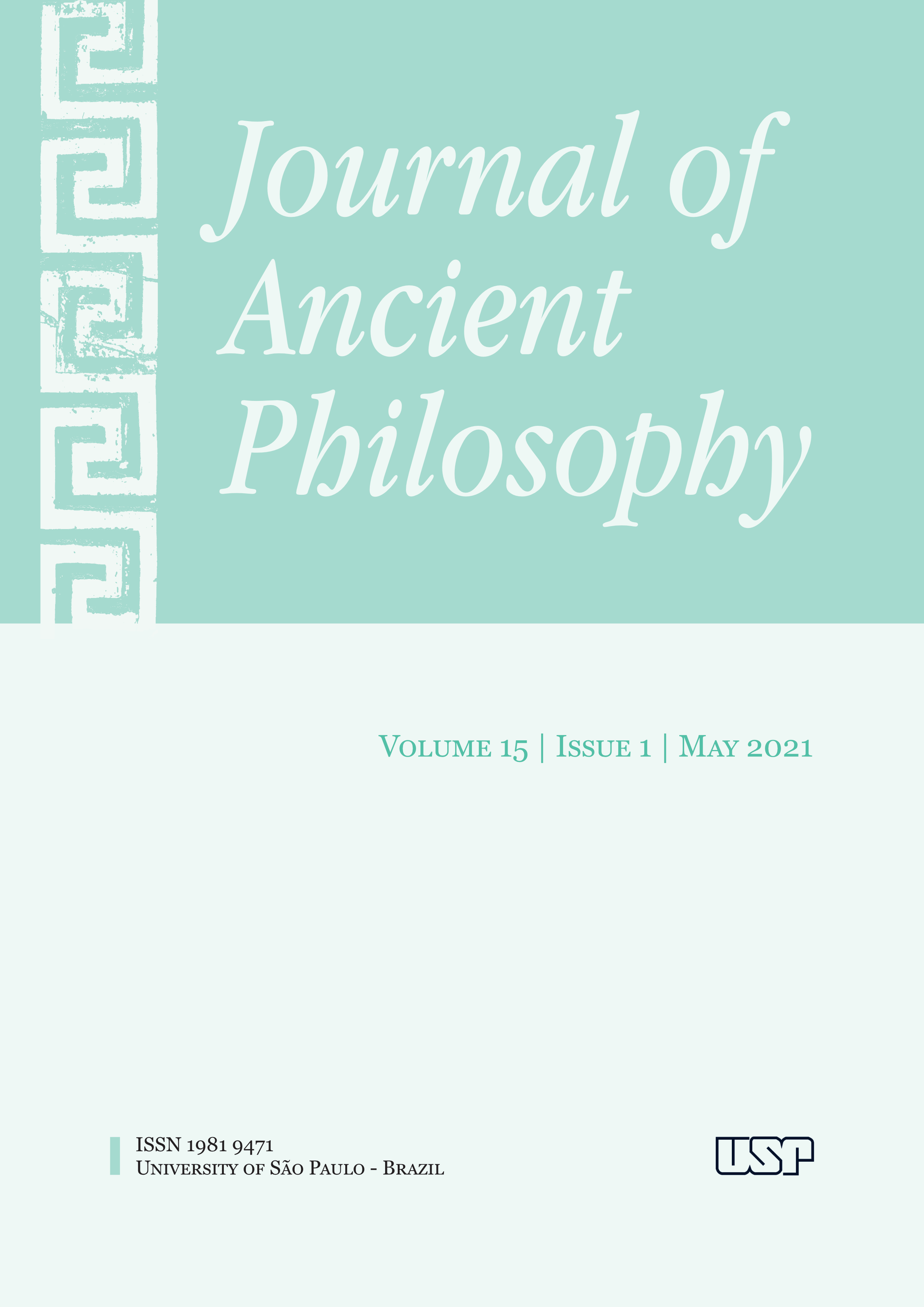Futuros contingentes: história de uma outra batalha
DOI:
https://doi.org/10.11606/issn.1981-9471.v15i1p207-260Keywords:
De interpretatione, batalha naval, futuros contingentesAbstract
The problem of future contingents is examined here through the vantage point of another controversy, the one over which answer Aristotle should be credited with. Two answers are attributed to Aristotle. According to the first one, which is nowadays often referred to as the traditional answer, Aristotle argued that, to prevent determinism as the valid conclusion of the argument presented at the beginning of De interpretation 9, one has to deny the universal validity of the principle of bivalence; according to the other, Aristotle accepted the validity of the principle of bivalence, but averted the conclusion of determinism by introducing the notion of indefinite verum. Both answers are examined with a view to shedding some light on this chapter that has kindled so much discussion.
Downloads
References
Ackrill, J. (1963) Aristotle’s Categories and De Interpretatione. Clarendon Press: Oxford.
Ademollo, F. (2010) The Principle of Bivalence in De Interpretatione 4. Oxford Studies in Ancient Philosophy 38: 97-113.
Anscombe (1981) From Parmenides to Wittgenstein: the collected papers of G.E.M. Anscombe. Blackwell: Oxford.
Barbosa Filho, B. (2013) Tempo, Verdade e Ação: Estudos de Lógica e Ontologia. Editora Paulus: São Paulo.
Blank, D. e Kretzmann, N. (1998) Ammonius: On Aristotle On Interpretation 9 with Boethius: On Aristotle On Interpretation 9. Bloomsbury: London.
Boys-Stones, G. (2018) Platonist Philosophy 80 BC to AD 250. Cambridge University Press: Cambridge.
Crivelli, P. (2004) Aristotle on Truth. Oxford University Press: Oxford.
Fine, G. (1984) Truth and Necessity in De Interpretatione 9, History of Philosophy Quarterly 1: 23-47.
Frede, D. (1970) Aristoteles und die ‘Seeschlacht’: Das Problem der Contingentia Futura in De Interpretatione 9. Vandenhoeck & Ruprecht: Göttingen.
Frede, D. (1972) Omne quod est quando est necesse est esse, Archiv für Geschichte der Philosophie 54: 153-67.
Frede, D. (1985) The Sea-Battle Reconsidered: a Defence of the Traditional Interpretation. Oxford Studies in Ancient Philosophy 3: 31-87.
Gaskin, R. (1995) The Sea Battle and the Master Argument: Aristotle and Diodorus Cronus on the Metaphysics of the Future. De Gruyter: Berlin.
Gaskin, R. (2000) Simplicius: On Aristotle’s Categories 9-15. Bloomsbury: London.
Giannantoni, G. (1981) Il kurieuôn logos di Diodoro Crono, Elenchos 2: 239-272.
Gourinat, J.-B. (2006) L’histoire du principe de bivalence selon Lukasiewicz, in R. Pouivet e M. Rebuschi (eds.), Philosophie en Pologne 1918-1939, Vrin, Paris (2006 : 37-66).
Griffin, M. (2015) Aristotle’s Categories in the Early Roman Empire. Oxford University Press: Oxford.
Hintikka, J. (1973) Time and Necessity: Studies in Aristotle’s Theory of Modality. Clarendon Press: Oxford.
Hintikka, J.; Knuuttila, S. e Remes, U. (1977) Aristotle on Modality and Determinism. Acta Philosophica Fennica 29 1.
Iacona, A. (2007) Future Contingents and Aristotle’s Fantasy, Crítica 39 117: 45-60.
Kirwan, C. (1986) Aristotle on the Necessity of the Present, Oxford Studies in Ancient Philosophy 4: 167-87.
Kneale, W. & M. (1991) O Desenvolvimento da Lógica. Fundação Calouste Gulbenkian: Lisboa.
Koch, I. (2019) La Causalité Humaine – sur le De Fato d’Alexandre d’Aphrodise. Classiques Garnier: Paris.
Kretzmann, N. (1998) Boethius and the truth about tomorrow’s sea battle, in D. Blank e N. Kretzmann (1998: 2452).
Łukasiewicz, J. (1957) Aristotle’s Syllogistic from the Standpoint of Modern Formal Logic. 2nd. ed. Clarendon Press: Oxford.
Łukasiewicz, J. (1967) Philosophical Remarks on Many-Valued Systems of Propositional Logic, in McCall (1967: 40-65).
Łukasiewicz, J. (1970) Selected Works, ed. By L. Borkowski. North-Holland Publishing Company: Amsterdam.
McCall, S. (ed.) Polish Logic 1920-139. Clarendon Press: Oxford.
Modrak, D. (2001) Aristotle’s Theory of Language and Meaning. Cambridge University Press: Cambridge.
Moraux, P. (1984) Der Aristotelismus bei den Griechen vol. II. De Gruter: Berlin.
Pouivet, R. e Rebuschi, M. (eds.) Philosophie en Pologne 1918-1939, Vrin: Paris.
Prawitz, D. (2009) Logical Determinism and the Principle of Bivalence, in Stoutland (2009: 111-135).
Quine, W. (1966) The Ways of Paradox and Other Essays, Random House: New York (1976, 2nd. ed.: Harvard University Press: Harvard).
Ross, D. (1924) Aristotle’s Metaphysics, Clarendon Press: Oxford.
Santos, R. (2016) Categorias – Da Interpretação. Imprensa Nacional: Lisboa.
Sharples, R (1982) An Ancient Dialogue on Possibility: Alexander of Aphrodisias Quaestio I 4, Archiv für Geschichte der Philosioohie 64: 23-38.
Sharples, R. (1983) Alexander of Aphrodisias – On Fate. Duckworth: London.
Sharples, R. (1992). Alexander of Aphrodisias – Quaestiones 1.1-2.15. Duckworth: London.
Sorabji, R. (1980) Necessity, Cause and Blame: Perspectives on Aristotle’s Theory. Cornell University Press: Ithaca.
Sorabji, R. (1998) The three deterministic arguments opposed by Ammonius, in D. Blank e N. Kretzmann (1998: 3-15).
Sorabji, R. (1998) Boethius, Ammonius and their different Greek backgrounds, in D. Blank e N. Kretzmann (1998: 16-23).
Stoutland, F. (2009) Philosophical Probings: essays on von Wright’s later work. Automatic Press: Kөbenhavn.
Weidemann, H. (2014) Aristoteles De Interpretatione. De Gruyter: Berlin.
Whitaker, C. (1996) Aristotle’s De Interpretatione: Contradiction and Dialectic. Clarendon Press: Oxford.
Wright, G. von (1984) Truth, Knowledge and Modality. Blackwell: Oxford.
Zimmermann, F. W. (1981) Al-Farabi’s Commentary and Short Treatise on Aristotle’s De Interpretatione. Oxford University Press: Oxford.
Downloads
Published
Issue
Section
License

This work is licensed under a Creative Commons Attribution 4.0 International License.
Copyright
Authors who publish with this journal agree to the following terms:
- Authors retain copyright and grant the journal right of first publication with the work simultaneously licensed under a Creative Commons Attribution License (CC By 4.0) that allows others to share the work with an acknowledgement of the work's authorship and initial publication in this journal.
- Authors are able to enter into separate, additional contractual arrangements for the non-exclusive distribution of the journal's published version of the work (e.g., post it to an institutional repository or publish it in a book), with an acknowledgement of its initial publication in this journal.
- Authors are permitted and encouraged to post their work online (e.g., in institutional repositories or on their website) prior to and during the submission process, as it can lead to productive exchanges, as well as earlier and greater citation of published work (See The Effect of Open Access).


